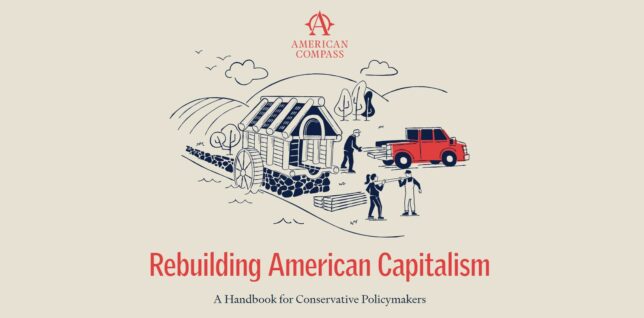Labor Watch
American Compass Blunders Left


I have watched with growing concern the rise in influence of American Compass among conservative policymakers. The think tank is headed by former Mitt Romney policy advisor Oren Cass. Noting that American Compass is funded by the Hewlett Foundation and the Omidyar nexus (two major, firmly left-wing philanthropies) and that American Compass has defended left-wing economic agenda items, I asked, “Does American Compass point left?”
With the issuance of American Compass’s manifesto Rebuilding American Capitalism: A Handbook for Conservative Policymakers, there is now a conclusive answer in the affirmative to that question. The manifesto calls upon conservative policymakers to enact enormous worldwide tariffs to constrain consumer choice, develop a broad-based system of central planning (er, “industrial policy”), raise taxes on financial transactions and business debts, and adopt the European model of “sectoral bargaining” in labor relations for which the Service Employees International Union (SEIU) has advocated. The notably non-conservative New York Times loved it, writing glowing paragraphs praising Compass allies Sens. Marco Rubio (R-FL), J.D. Vance (R-OH), Tom Cotton (R-AR), and Todd Young (R-IN) for breaking with free-market capitalism.
A Pair of Good Ideas
Like a broken clock that is correct twice daily, American Compass’s manifesto was not entirely leftist dreck. Immigration restrictionists, including those with their own awkward ties to left-wing environmentalists, will appreciate American Compass’s support for their issues. Social conservatives are offered parenting subsidies and restrictions on social media company practices that may or may not be practical.
Even I will concede the usefulness of two American Compass proposals. Making student loans dischargeable in bankruptcy proceedings, as the manifesto proposes, would defuse demands for even-more-statist (and legally questionable) periodic “student debt forgiveness” while allowing borrowers to write off unserviceable loans at a penalty in a manner consistent with longstanding American practice. Likewise, repeal of the National Environmental Policy Act, which frequently serves as little more than a procedural barrier to building needed infrastructure ripe for exploitation by special interest groups looking for handouts, would expedite and reduce the financial costs of building projects at a negligible environmental cost.
And Many Bad Ones
But the remainder of the proposals should be ignored or affirmatively rejected by conservative policymakers. I leave disputing American Compass’s policy proposals to enact a tariff to eliminate the trade deficit, institute vast increases in economic central planning, and levy financial transaction taxes to experts in those fields, I will focus on American Compass’s bad labor policies (as I have before, and often).
In its discussion of labor relations, Rebuilding American Capitalism makes five policy recommendations. One is not facially objectionable. If it were possible to “Establish parameters for voluntary, non-political, worker-controlled organizations that can receive employer and government funds and administer benefits and training programs,” it might be beneficial. One is a powerful boon to currently existing labor unions: Increasing the National Labor Relations Board’s power to reinstate workers fired during organizing campaigns aids Big Labor at the expense of businesses of all sizes, not just the largest firms many populist conservatives loathe. Arguably such a rule would target small businesses that lack expensive compliance departments with well-paid lawyers the hardest.
That leaves three proposals: Two awful, and one illustrative in its toothlessness. “Rebuilding American capitalism” apparently involves realigning labor relations on the lines of the European social democracies, adopting not only works councils but also sectoral bargaining. Contrary to the claims of former Trump administration Labor Department official Jonathan Berry, works councils are far from a conservative consensus position. (For an argument from the right against them, see mine, which called them “A Misguided Republican Gift to Big Labor.”) Put most briefly, depending on how they are constructed they offer labor unions a path into nonunion workplaces and deny workers and employers the freedom to choose to conduct independent negotiations.
Sectoral bargaining, a policy demand of the Service Employees International Union being trialed in Big Labor’s Golden State, is even worse. Rather than compelling individual employers to negotiate with majority-status unions representing single workplaces, sectoral bargaining would compel employer associations to negotiate with unions representing entire industries—union members or not. (This is how France has near-universal collective bargaining “coverage”—workers working under union contracts—even though the proportion of the workforce who are actually union members is about the same as in the United States.)
As I have written before, I do not understand how allowing a labor union like the NewsGuild-CWA to negotiate for non-members (who might possibly include me, so this is personal) is supposed to protect conservatives’ social views or build a cohesive community. This is a union that in recent years has denounced the publication of an op-ed by Compass ally Sen. Cotton, called by implication for the elimination of the State of Israel in a tweet, and allegedly defamed a journalist for accurate reporting on George Soros’s political donations.
One Cannot Fix What One Fails to Understand
And that brings us to the final policy, which I will quote directly from the Rebuilding American Capitalism manifesto because precision matters in the analysis of it: “Prohibit traditional unions—and any other organizations that collect mandatory worker dues, have legal authority to represent workers in collective bargaining, or provide workers with government-funded benefits—from spending funds on partisan political activities. Affiliated PACs with independent fundraising can make such expenditures, as 501(c)(4) political action groups separate from 501(c)(3) nonprofits do today.”
The implication is that such a regulation could be passed to depoliticize organized labor and refocus it on worker representation. There’s just one teeny, tiny problem: That doesn’t change the law much. Unions’ most important political-advocacy infrastructure building is not electoral: It is lobbying governments and supporting the broader liberal advocacy infrastructure of which Big Labor is a pillar.
Federal campaign finance law has, since the Smith-Connally Act of 1943, banned unions from directly contributing to federal elections through dues-funded political contributions. (Limits on independent expenditures enacted by the Taft-Hartley Act were nullified as part of the Citizens United v. FEC Supreme Court decision, which held that businesses and labor unions had a constitutional right to spend money advocating for or against political candidates as long as those expenditures were not coordinated with a campaign.)
But unions have always found ways to skirt those regulations (and similar state-level regulations in states that have a similar rule) to stay deeply political. Indeed, the original political action committee (PAC), which was funded by “independent fundraising” from union members, was developed by the Congress of Industrial Organizations (the CIO in AFL-CIO) to support Franklin Roosevelt’s fourth election campaign just one year after Smith-Connally’s passage. (To make matters even messier, one of the CIO officials who proposed the PAC was an admitted Communist who claimed before his death that a Communist Party USA official pitched the idea to the CIO.) Unions maintain these “independent fundraising” separate segregated funds to make campaign contributions to this day.
And Big Labor’s nonpartisan political activities are if anything more important than its direct support for political campaigns. Unions demand the adoption of liberal diversity, equity, and inclusion (DEI) programming in contract negotiations and lobbying campaigns. (No, Sen. Rubio, organized labor is not a defense against a “woke human resources fad,” it is the woke H.R. fad.) Unions use dues money to fund ballot measure campaigns on liberal social issues and numerous projects of the liberal Democracy Alliance.
Conclusion
The lesson? Limiting campaign contributions or independent expenditures, or even instituting a 501(c)(3)-style proscription on direct election intervention won’t keep Big Labor out of politics. In an editorial in Rebuilding American Capitalism, Brian Dijkema argues, “At least at a conceptual level, apart from families, trade unions are among the institutions in America most aligned with conservative principles and capable of advancing conservative ends.” Contra his claim, organized labor is staunchly progressive, commits to a full-spectrum and coercive progressive agenda, and aligns with the broader liberal-progressive movement. Dijkema’s claim that labor unionism has a “conservative heart” is contrary to over 130 years of history. (The ashes of the charismatic leader of the early-20th century Wobblies, Big Bill Haywood, were interred in the Kremlin Wall Necropolis under Stalin.)
And if advocates refuse to recognize the facts of history, they commit to blunder.



